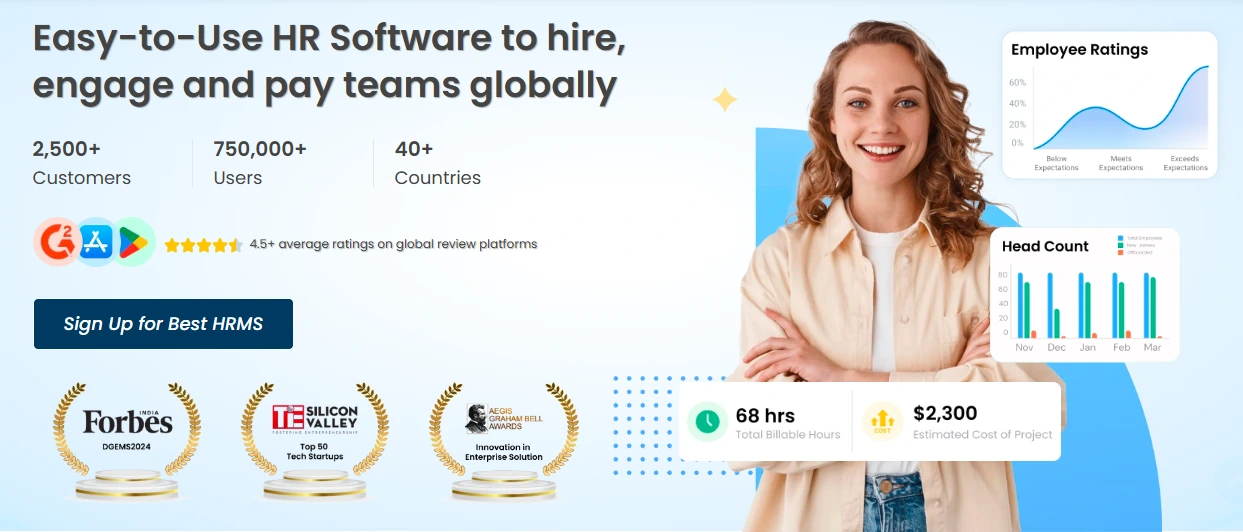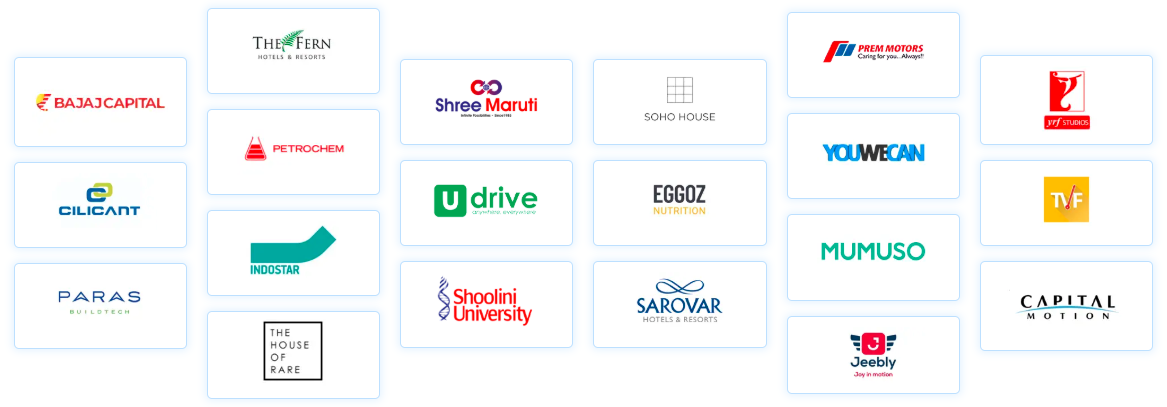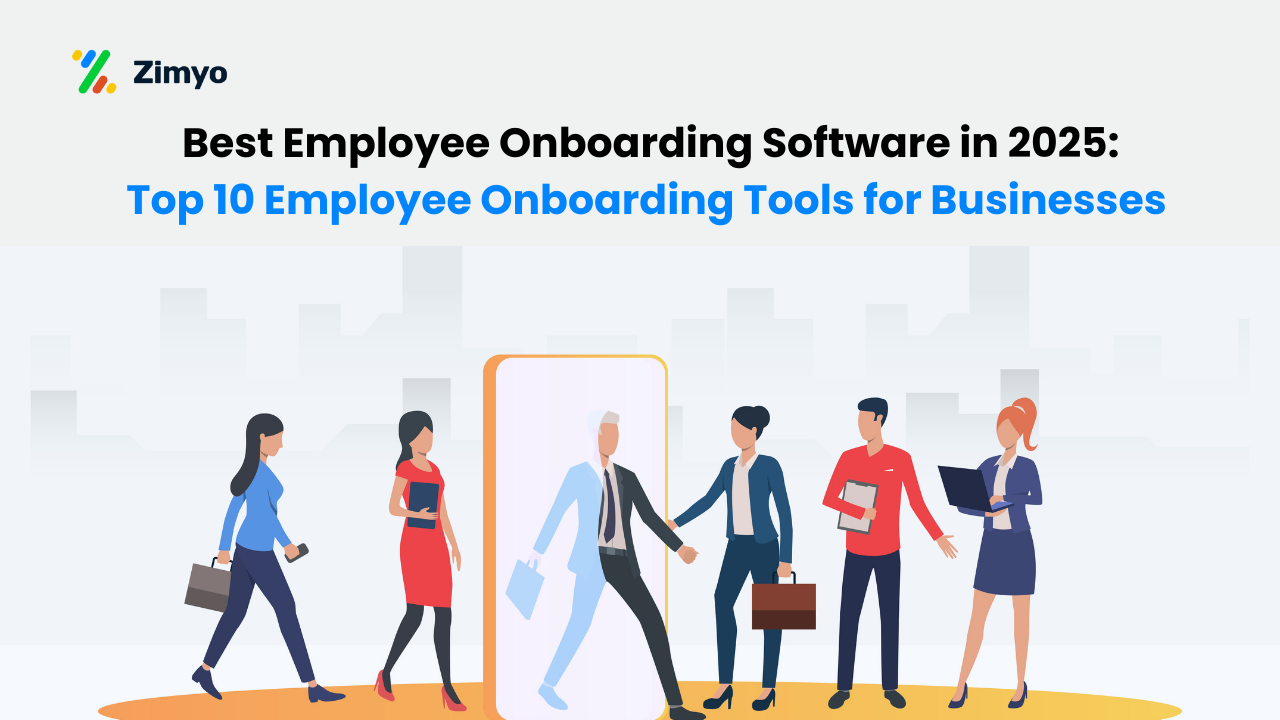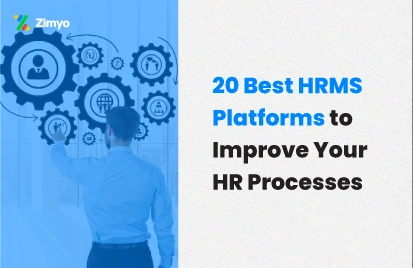Hiring people might not be the flashiest job in running a small business, but it is one of the most important. For owners and managers who are short on time and resources, slow or messy hiring steps can cause delays, confusion, and even make you lose good candidates. One late reply to a candidate or one missed application can cost you the right hire. This is why using the Best Recruiting Software for Small Business is not just helpful, it is necessary.
The right small business recruiting software does more than just post jobs. It helps you keep track of candidates, manage applications, set up interviews, and make better hiring choices.
Good small business hiring software saves time, reduces mistakes, and gives a smooth experience to both candidates and hiring teams. The best applicant tracking systems for small businesses are easy to use, budget-friendly, and can grow with your business needs.
In this blog, we list the best applicant tracking software for small business, tools that mix strong features with simple design. From recruiting software for small business that makes daily hiring easier to advanced tools that help you build a strong team, this is your guide to picking the software that fits your business size, goals, and hiring plans.
List of 13 Best Recruiting Software for Small Business
- Zimyo
- Workable
- Zoho Recruit
- Greenhouse
- Lever
- Recruitee
- Breezy HR
- JazzHR
- ApplicantStack
- Recruit CRM
Best Recruiting Software for Small Business: Explained in Detail
1. Zimyo
Zimyo stands proudly at the top of the Best Recruiting Software For Small Business, giving you an all-in-one, cloud-based platform that does much more than just hiring. Recognized as one of the Best Applicant Tracking Systems For Small Businesses in the USA, Zimyo brings together every tool you need for small business recruiting software, small business hiring software, and applicant tracking software for small business, all in one easy-to-use place.
Made for growing small businesses, Zimyo works perfectly whether you have 5 employees or 200. It helps you post jobs, track applicants, manage interviews, and hire faster with automation that saves you time and effort. Its smooth integrations with email, calendars, and other business tools make your recruiting process faster, more organized, and error-free. This makes it the most reliable recruiting software for small business in 2025.
Zimyo is not just about collecting resumes. It gives you real-time data, hiring reports, and analytics so you can make the right hiring decisions. Features like candidate tracking, interview scheduling, onboarding, and employee database management help you run your HR smoothly without extra work.
What makes Zimyo the #1 choice is its simple design, excellent customer support, transparent pricing, and constant updates. You always get the latest hiring tools and features without paying extra. For any small business that wants to hire faster, smarter, and keep top talent, Zimyo is the clear winner in Best Recruiting Software For Small Business.
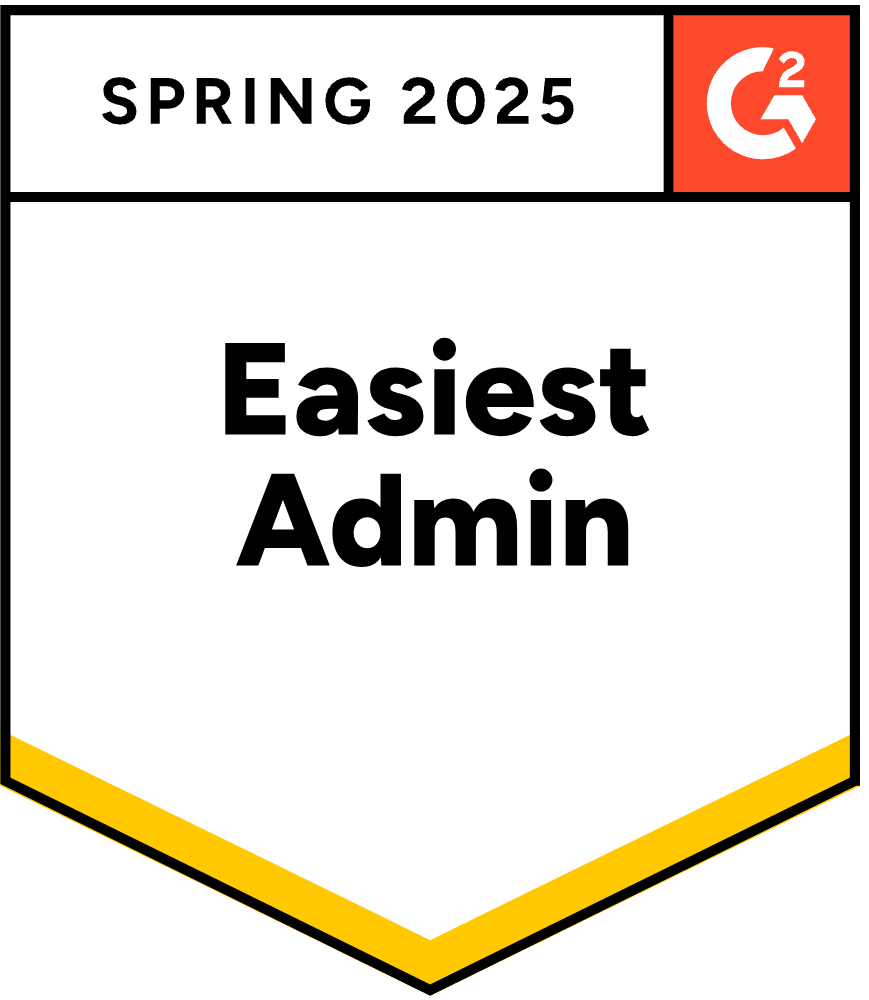
Key Features of Zimyo Recruiting Software:
- 2X faster and efficient hiring process – Streamlines every stage of recruitment from sourcing to onboarding.
- Automated bulk resume parsing – Quickly process and organize multiple resumes at once.
- Talent pool storage – Securely save potential resumes for future opportunities.
- Precision candidate actions – Take swift and accurate actions on candidate profiles.
- Timeline review – Track all actions taken on a candidate in one view.
- Custom hiring workflows – Personalize and optimize recruitment steps to suit your needs.
- Multiple job board integrations – Post and manage jobs across various platforms from one place.
- Comprehensive analytics insights – Get data-driven hiring reports and metrics for better decisions.
- Proctor-enabled assessments – Conduct secure and monitored skill evaluations.
- Bulk job creation – Create multiple job listings simultaneously.
- Kanban workflow optimization – Manage hiring tasks visually for better clarity and efficiency.
- Assessment question library – Access a ready-made collection of questions for effective candidate testing.
Don’t just trust us! Check Zimyo reviews yourself.
2. Workable
Workable is a leading recruiting software that helps businesses streamline their hiring process from start to finish. It offers applicant tracking, job posting to multiple job boards, candidate management, and collaborative hiring tools to make recruitment faster and more efficient. With features like AI-powered candidate sourcing, video interviews, and analytics-driven hiring decisions, Workable enables companies to attract, engage, and hire top talent with ease. It is designed to improve efficiency, reduce time-to-hire, and deliver the simplest recruitment experience for both recruiters and candidates.
While Workable is powerful and user-friendly, it does have some drawbacks. Smaller businesses may find its pricing on the higher side compared to other recruiting software options. Some users report that the platform can feel overwhelming initially due to its wide range of features, requiring a learning curve for new recruiters. Additionally, certain advanced functions like in-depth customization or niche integrations may be limited, which could be a drawback for companies with very specific hiring needs.
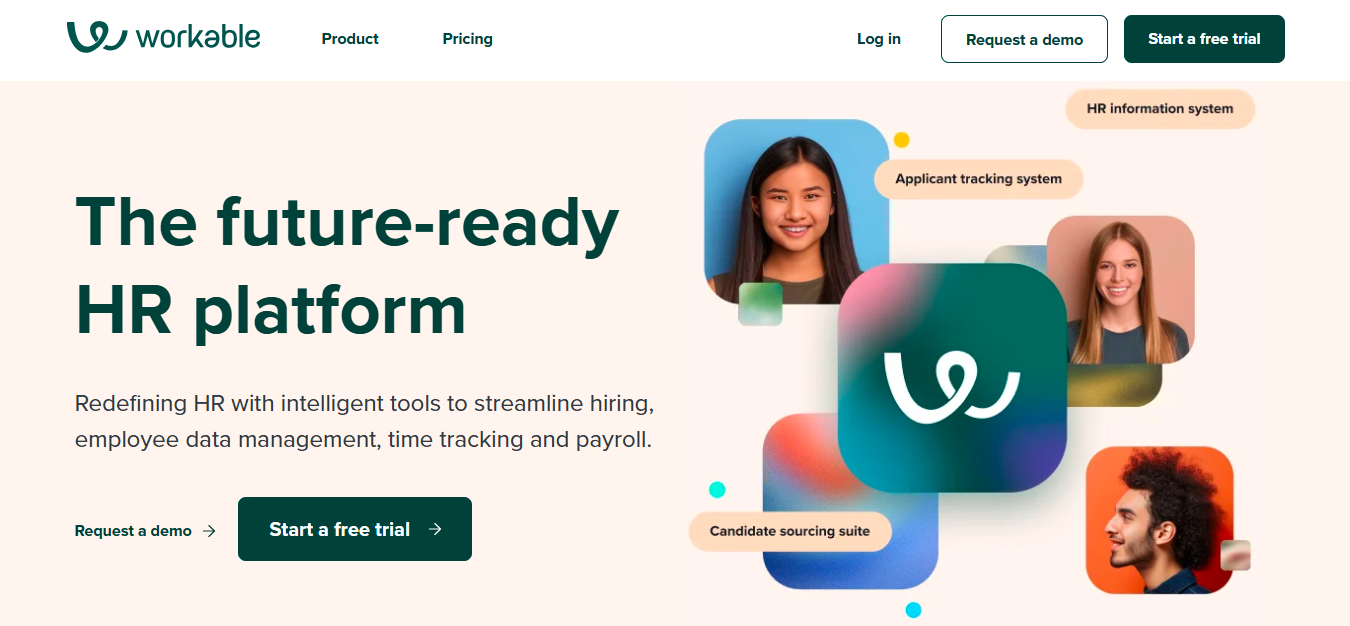
Key Features
- AI-powered candidate sourcing
- One-click job posting to multiple boards
- Built-in video interviewing
- Customizable hiring pipelines
- Advanced reporting and analytics
Pros & Cons
Pros | Cons |
Easy-to-use interface | Limited customization in lower-tier plans |
Wide job board integrations | Can be expensive for small businesses |
Strong candidate sourcing tools | Some advanced features locked behind higher plans |
Built-in collaboration features | Reporting customization is limited |
Excellent mobile app experience | Occasional delays in customer support response |
Wanna ramp up your onboarding stage? Get the Complete Employee Onboarding Process 2025: A Modern Step-by-Step Guide to Wow New Hires
2. Zoho Recruit
Zoho Recruit is a powerful recruitment management software designed to streamline every stage of the hiring process, making it faster and more efficient for recruiters and hiring managers. With features like candidate management, job management, automated resume parsing, applicant tracking, and integration with multiple job boards, it empowers businesses to attract, engage, and hire top talent seamlessly. Its robust analytics, customizable workflows, and collaborative tools help recruiters make data-driven hiring decisions without any hassles.
While Zoho Recruit offers extensive features, it has some limitations. The interface can feel overwhelming for new users due to the abundance of tools and settings. Some advanced features, like AI-powered candidate matching and deeper analytics, are restricted to higher-priced plans. Integration with certain third-party apps can require additional setup effort, and customer support response times may vary depending on the service plan.
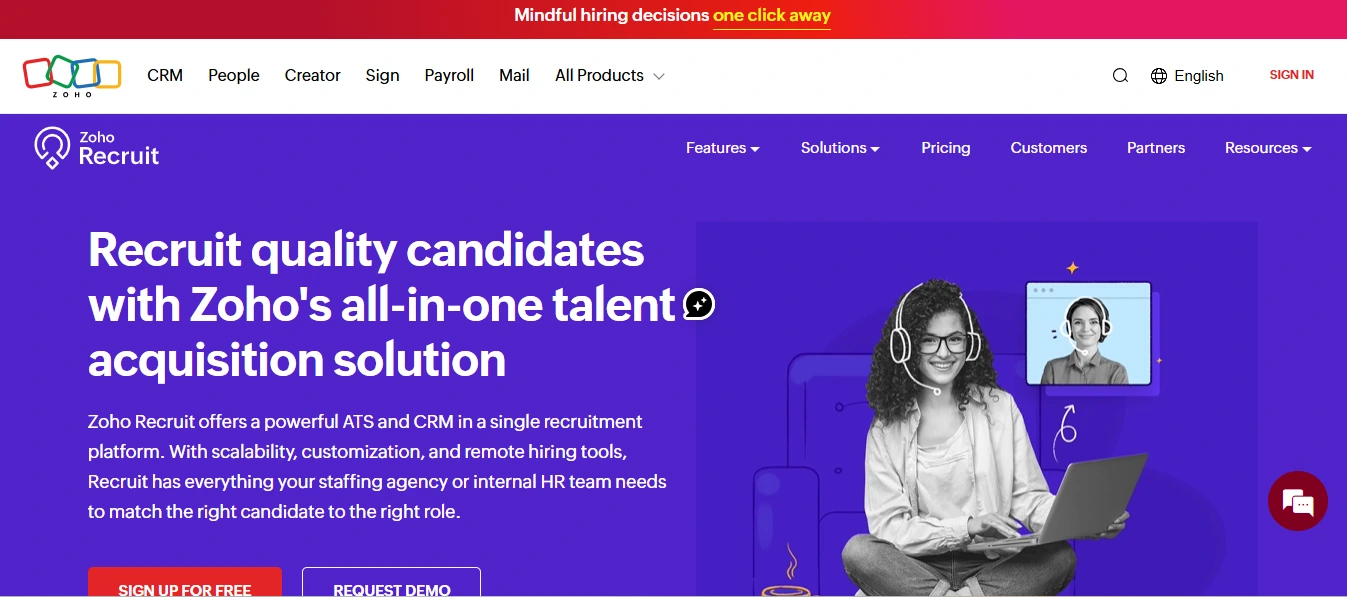
Key Features
- AI-powered candidate matching
- Automated resume parsing
- Multi-channel job posting
- Customizable recruitment pipelines
- Built-in background screening integration
Pros & Cons
Pros | Cons |
Affordable pricing for core features | Steep learning curve for beginners |
Highly customizable workflows | Advanced features locked in premium plans |
Strong automation for recruitment tasks | Occasional integration complexities |
Extensive job board and social media posting | UI can feel cluttered at times |
Good analytics and reporting tools | Support response time can be inconsistent |
Curious to know how to hire virtually? Learnt the meaning of E Recruitment
4. Greenhouse
Greenhouse is a leading recruitment management software designed to streamline and optimize every step of the hiring process. It helps businesses attract, engage, and hire top talent faster and more efficiently through features like automated recruitment workflows, centralized candidate data management, and seamless job board integrations. From bulk resume parsing to structured interview processes, Greenhouse ensures recruiters can identify the right candidates and move them smoothly into onboarding without hassles. Its advanced analytics and reporting tools also empower data-driven hiring decisions.
While Greenhouse is highly regarded for its robust functionality, it comes with certain limitations. The software’s pricing structure can be expensive for small and mid-sized businesses. Some users find its initial setup and customization process complex, requiring additional training to fully utilize its potential. Integration with niche third-party tools may require extra effort, and reporting, though detailed, can sometimes feel overwhelming for teams that prefer simpler dashboards.

Key Features
- Structured hiring workflows
- Interview kits and scorecards
- Automated candidate communication
- Advanced analytics and reporting
- Multi-job board posting integration
Pros & Cons
Pros | Cons |
Streamlined and automated recruitment workflows | Expensive for small businesses |
Centralized candidate data management | Complex initial setup |
Easy integration with popular job boards | Limited integrations with niche tools |
Strong analytics and reporting capabilities | Reporting can be overwhelming |
Enhances candidate experience with timely communication | Steeper learning curve for beginners |
Having the recruiting software is indispensable in today’s times. Hence, for that matter, you must learn the Importance of Having Recruitment Management Software for Modern Businesses
5. Lever
Lever is a powerful recruiting software designed to combine applicant tracking system (ATS) capabilities with customer relationship management (CRM) features, enabling businesses to build and nurture strong candidate pipelines. It allows recruiters to source, engage, and hire top talent efficiently through collaborative hiring tools, automated workflows, and advanced analytics. Lever’s intuitive interface and customizable dashboards make it easy for hiring teams to stay aligned, track candidates at every stage, and ensure a smooth recruitment experience for both recruiters and applicants.
Despite its many strengths, Lever has certain drawbacks. The software’s pricing can be on the higher side, especially for small businesses. Some users report that its reporting and analytics tools, while comprehensive, can be complex for those without data expertise. Integrations with some specialized tools may require additional setup effort, and occasional system lags during high usage have been noted. Its customization options, though extensive, can feel overwhelming for first-time users.
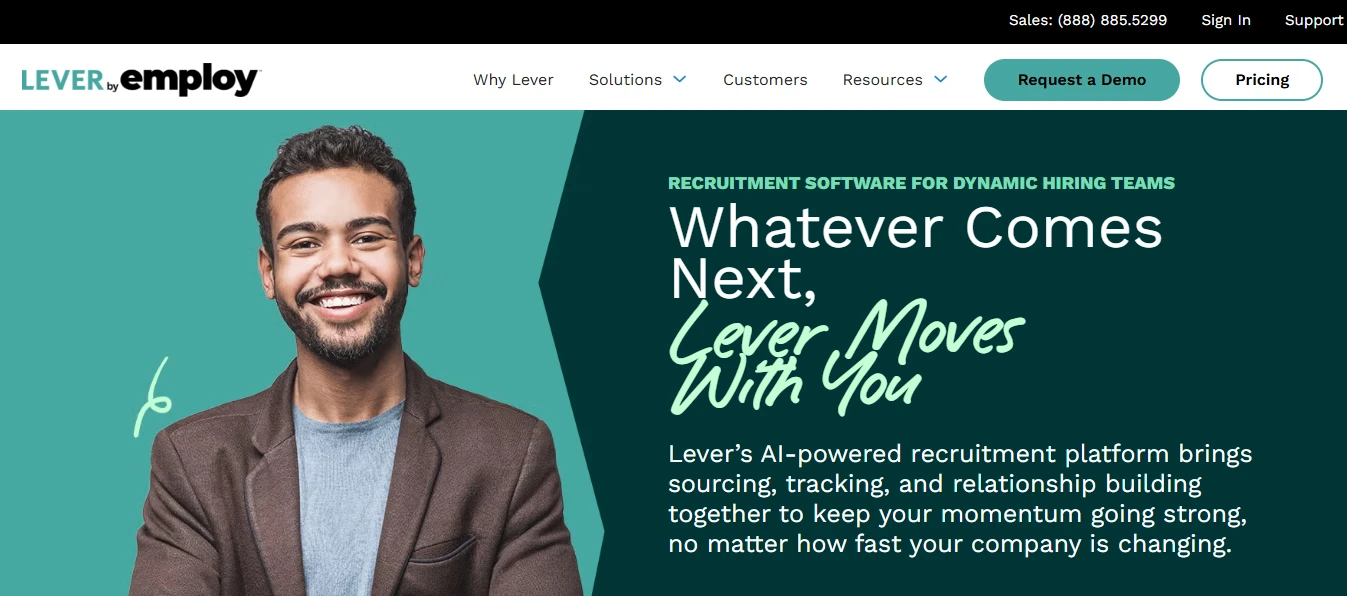
Key Features
- Integrated ATS and CRM capabilities
- Candidate relationship management tools
- Collaborative hiring workflows
- Advanced analytics and reporting
- Seamless integration with popular sourcing platforms
Pros & Cons
Pros | Cons |
Combines ATS and CRM in one platform | Higher pricing for small businesses |
Enhances collaboration among hiring teams | Analytics can be complex for non-data users |
Strong candidate relationship management features | Integration with niche tools may require extra setup |
Comprehensive reporting and analytics | Occasional system lags during peak usage |
Smooth candidate experience through automation | Customization can feel overwhelming |
Do you want to master your recruitment and onboarding? Here are some of the best hiring tips.
6. Recruitee
Lever is a powerful recruiting software designed to combine applicant tracking system (ATS) capabilities with customer relationship management (CRM) features, enabling businesses to build and nurture strong candidate pipelines. It allows recruiters to source, engage, and hire top talent efficiently through collaborative hiring tools, automated workflows, and advanced analytics. Lever’s intuitive interface and customizable dashboards make it easy for hiring teams to stay aligned, track candidates at every stage, and ensure a smooth recruitment experience for both recruiters and applicants.
Despite its many strengths, Lever has certain drawbacks. The software’s pricing can be on the higher side, especially for small businesses. Some users report that its reporting and analytics tools, while comprehensive, can be complex for those without data expertise. Integrations with some specialized tools may require additional setup effort, and occasional system lags during high usage have been noted. Its customization options, though extensive, can feel overwhelming for first-time users.
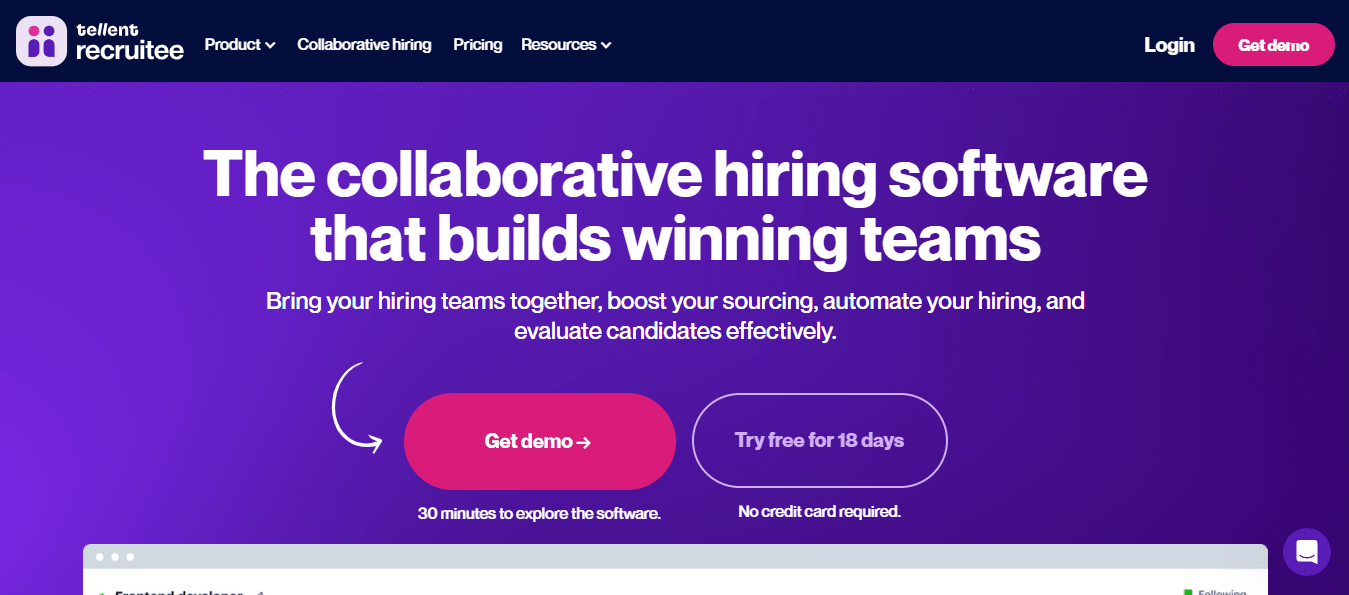
Key Features
- Integrated ATS and CRM capabilities
- Candidate relationship management tools
- Collaborative hiring workflows
- Advanced analytics and reporting
- Seamless integration with popular sourcing platforms
Pros & Cons
Pros | Cons |
Combines ATS and CRM in one platform | Higher pricing for small businesses |
Enhances collaboration among hiring teams | Analytics can be complex for non-data users |
Strong candidate relationship management features | Integration with niche tools may require extra setup |
Comprehensive reporting and analytics | Occasional system lags during peak usage |
Smooth candidate experience through automation | Customization can feel overwhelming |
Level up your hiring game by finding out the Top 8 HR Trends in 2025.
7. Breezy HR
Breezy HR is an intuitive recruiting software tailored for small to mid-sized businesses, helping teams attract, manage, and hire talent without the usual complexities. It offers a drag-and-drop pipeline interface, automated job postings to multiple boards, and collaborative hiring tools that make teamwork seamless. With features like video interviewing, candidate scoring, and resume parsing, Breezy HR helps businesses cut down on hiring time while keeping the candidate experience engaging and professional.
Although Breezy HR offers ease of use and efficiency, it may not be as feature-heavy as enterprise-grade platforms. Advanced analytics can feel limited for data-driven organizations, and certain integrations may require higher-tier plans. Some users also find the customization options less extensive compared to competitors.
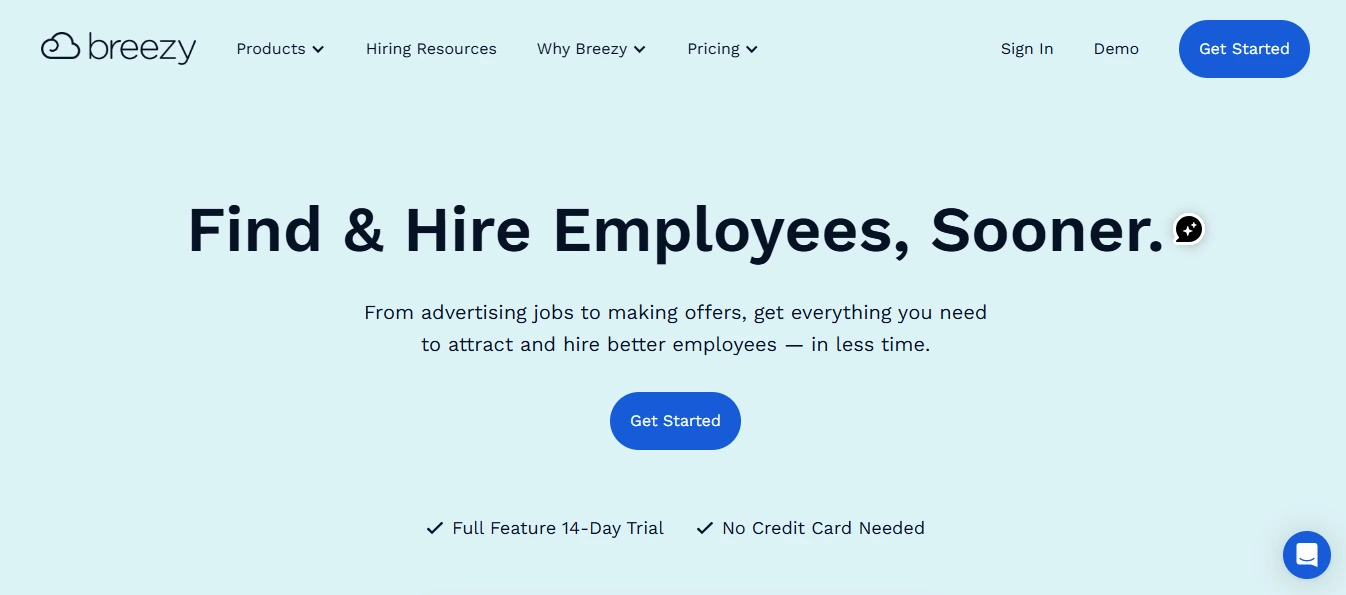
Key Features
- Drag-and-drop candidate pipeline
- Multi-job board posting
- Video interview capabilities
- Automated candidate communication
- Team collaboration tools
Pros & Cons
Pros | Cons |
Simple and user-friendly interface | Limited advanced analytics |
Affordable pricing for small businesses | Fewer customization options |
Strong focus on collaborative hiring | Some integrations require higher plans |
Built-in video interview tools | Lacks enterprise-level scalability |
Quick setup and onboarding | Limited reporting depth |
8. JazzHR
JazzHR is a powerful recruitment management software designed specifically for growing small businesses. It enables companies to create custom hiring workflows, post jobs to multiple boards instantly, and manage candidates efficiently. Its applicant tracking system is highly intuitive, while features like resume parsing, interview scheduling, and offer management make the end-to-end hiring process smoother and faster. JazzHR helps businesses find the right talent without breaking the budget.
While JazzHR is budget-friendly and effective, it can fall short for larger organizations that require complex automation and reporting. The analytics, though functional, may not be as in-depth as premium tools. Some integrations are available only at higher subscription tiers, and the mobile experience is less robust compared to desktop.
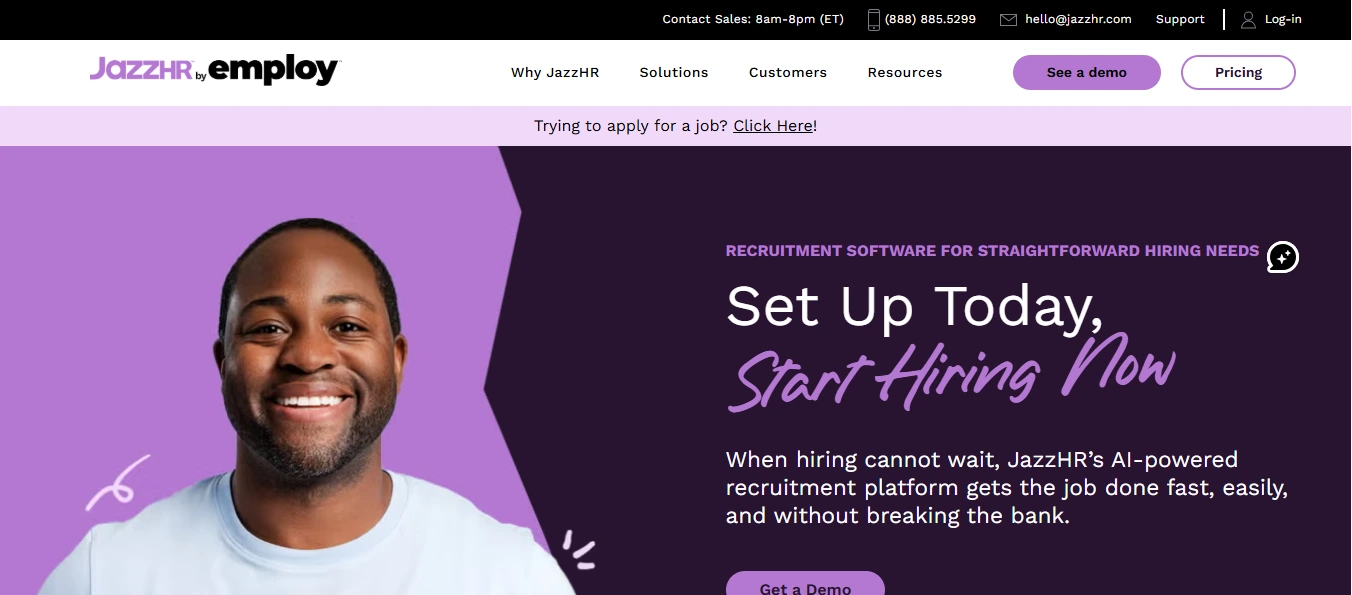
Key Features
- Custom hiring workflows
- Multi-board job posting
- Resume parsing and search
- Interview scheduling tools
- Offer letter management
Pros & Cons
Pros | Cons |
Affordable and scalable for SMBs | Less suited for large enterprises |
Easy-to-use ATS interface | Limited mobile optimization |
Strong job posting capabilities | Advanced features require higher plans |
Customizable hiring stages | Reporting not as comprehensive |
Quick candidate sourcing | Some integrations are restricted |
Have you ever thought we could use AT for hiring? Well yes! Get to know the 20 Effective AI-Based Recruitment Methods.
9. ApplicantStack
ApplicantStack is a flexible and affordable recruiting software built for small and midsize businesses to manage their entire hiring process in one place. It offers customizable application forms, automated email communication, and seamless job board posting. With its applicant tracking and onboarding modules, teams can reduce manual tasks, speed up hiring, and ensure candidates stay informed at every stage.
While ApplicantStack is user-friendly, its interface can feel outdated compared to more modern tools. Reporting and analytics are basic, which may not satisfy data-focused recruiters. Integrations are functional but not as extensive, and customization options are limited for teams with highly specific needs.
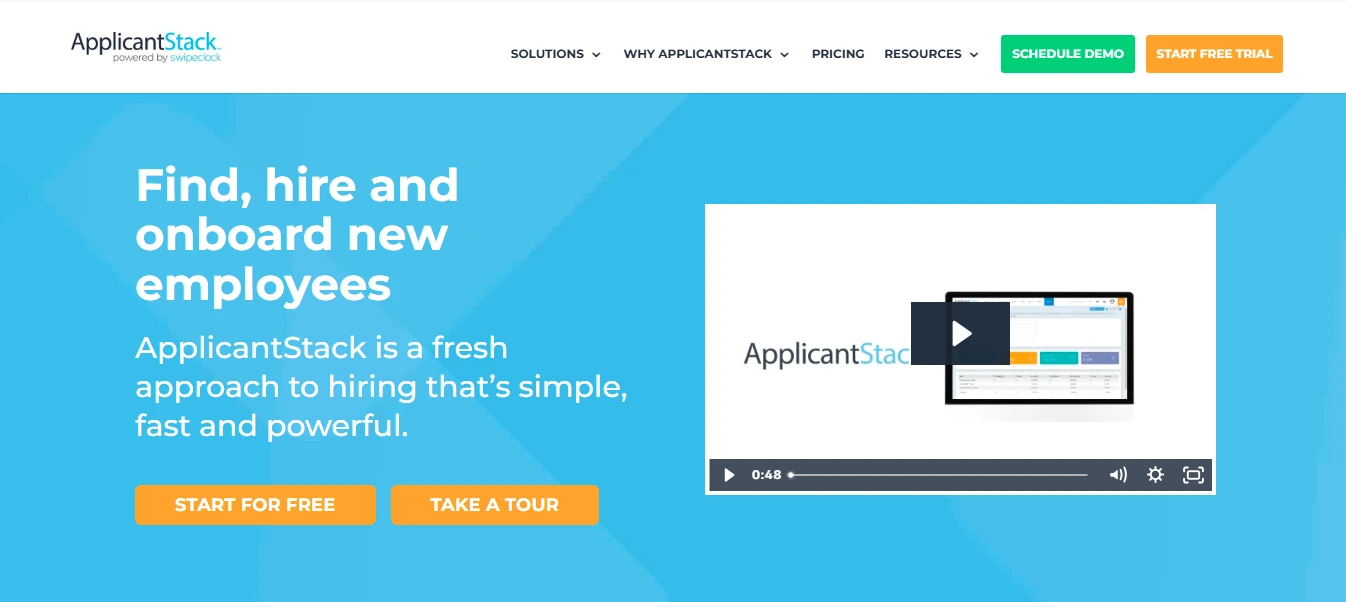
Key Features
- Custom application forms
- Automated email workflows
- Multi-job board posting
- Applicant tracking and onboarding
- Candidate search and filtering
Pros & Cons
Pros | Cons |
Affordable pricing | Interface feels dated |
Easy automation of repetitive tasks | Limited advanced analytics |
Integrated onboarding features | Fewer customization capabilities |
Strong job board distribution | Limited integration options |
Good for SMB hiring needs | Less suitable for complex workflows |
If you want to immerse in a deeper process of recruitment, then jump onto our Recruitment Guide: The secret sauce of hiring the best quality candidates.
10. Recruit CRM
Recruit CRM is a modern recruitment software built for staffing agencies and hiring teams who want all-in-one functionality. It combines ATS and CRM capabilities, allowing recruiters to manage candidates, clients, and job orders in one system. Its global job board posting, AI-powered resume parsing, and advanced reporting help recruiters work faster and smarter. Recruit CRM also offers powerful integrations and customization, making it flexible for diverse hiring needs.
Despite its strengths, Recruit CRM can be costly for smaller teams. Its wide range of features can feel overwhelming for new users, and the mobile app, while functional, lacks some desktop capabilities. Certain advanced automation tools may require additional setup time.
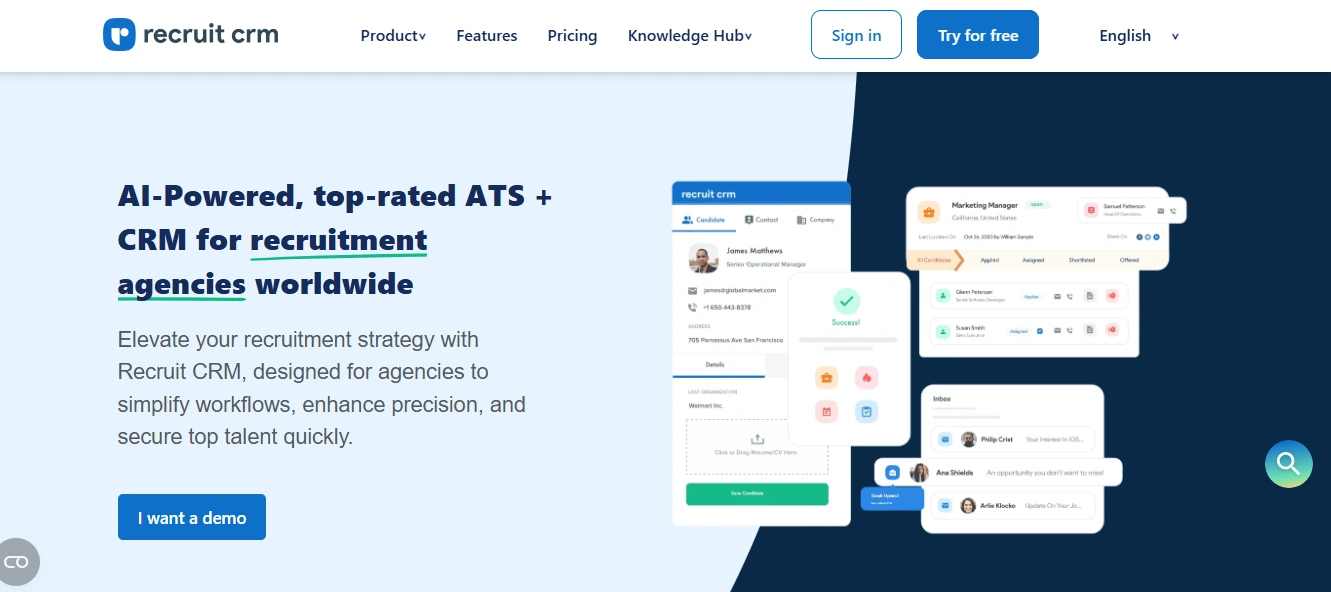
Key Features
- ATS + CRM in one platform
- AI-powered resume parsing
- Global job board posting
- Advanced reporting and analytics
- Client and candidate management tools
Pros & Cons
Pros | Cons |
Combines CRM and ATS seamlessly | Higher pricing for small teams |
AI tools for faster hiring | Steeper learning curve |
Global posting capabilities | Mobile app has fewer features |
Excellent customization options | Advanced automation needs setup |
Strong analytics and reporting | Can feel overwhelming for beginners |
Why do the best employees quit? May you have never encountered the term Talent Retention. Learn it today and retain your top talent.
Recruiting Software Comparison Table for Small Business (2025)
Recruiting Software | Key Features | Ease of Use | Integration Capabilities |
Zimyo | Applicant tracking, onboarding, job posting, resume parsing, analytics | ★★★★★ | ★★★★★ |
Workable | AI-powered sourcing, interview scheduling, job board integrations | ★★★★☆ | ★★★★☆ |
Zoho Recruit | Candidate tracking, automation, resume parsing, job postings | ★★★★☆ | ★★★★☆ |
Greenhouse | Structured hiring, analytics, job board posting, interview kits | ★★★★☆ | ★★★★☆ |
Lever | ATS + CRM, pipeline management, analytics, automation | ★★★★☆ | ★★★★☆ |
Recruitee | Drag-and-drop pipeline, automation, team collaboration tools | ★★★★☆ | ★★★★☆ |
Breezy HR | Visual pipelines, video interviews, job board posting | ★★★★☆ | ★★★★☆ |
JazzHR | Job postings, interview scheduling, offer management | ★★★★☆ | ★★★☆☆ |
ApplicantStack | Job postings, onboarding, resume management | ★★★★☆ | ★★★★☆ |
Recruit CRM | ATS + CRM, automation, sourcing tools | ★★★★☆ | ★★★★☆ |
Can Small Businesses Today Survive Without Recruiting Software?
In today’s fast-moving business world, hiring is no longer just about posting jobs and collecting resumes, it’s about finding the right talent quickly, staying organized, improving the candidate experience, and making smarter hiring decisions.
Small businesses trying to handle all these steps manually often face delays, missed opportunities, and wasted time. That’s why investing in the Best Recruiting Software for Small Business is no longer a luxury, it’s a must-have.
The small business recruiting software available today offers much more than a basic tool for storing resumes. The right small business hiring software can post jobs on multiple platforms, track applicants, schedule interviews, and give insights that help you choose the best candidates.
The best applicant tracking systems for small businesses centralize all hiring tasks in one place, saving time and reducing errors. Modern applicant tracking software for small business also integrates with other tools, making the recruitment process faster, more accurate, and easier to manage. With the right recruiting software for small business, hiring becomes more efficient, transparent, and effective.
Why Should Every Small Business opt for Recruiting Software?
In today’s competitive hiring landscape, small businesses cannot afford to rely solely on manual recruitment processes. Recruiting software is no longer a “big company luxury” … it’s a necessity. It streamlines every step of the hiring process, from posting jobs on multiple job boards to tracking applicants, scheduling interviews, and onboarding new hires. By automating repetitive tasks and centralizing candidate data, recruiting software saves valuable time, reduces hiring costs, and ensures a better candidate experience.
For small businesses, the benefits are even more significant. Limited HR teams often juggle multiple responsibilities, making it difficult to maintain a structured and efficient recruitment pipeline. With features like applicant tracking, resume parsing, job posting automation, and analytics dashboards, small businesses can compete with larger companies in attracting top talent.
Investing in recruiting software also improves quality of hire, shortens time-to-fill, and enhances collaboration between hiring managers and recruiters. Whether it’s ATS integration, customizable workflows, or mobile hiring capabilities, these tools help small businesses stay agile, organized, and competitive in the war for talent.
How to Choose the Best Recruiting Software for Small Business
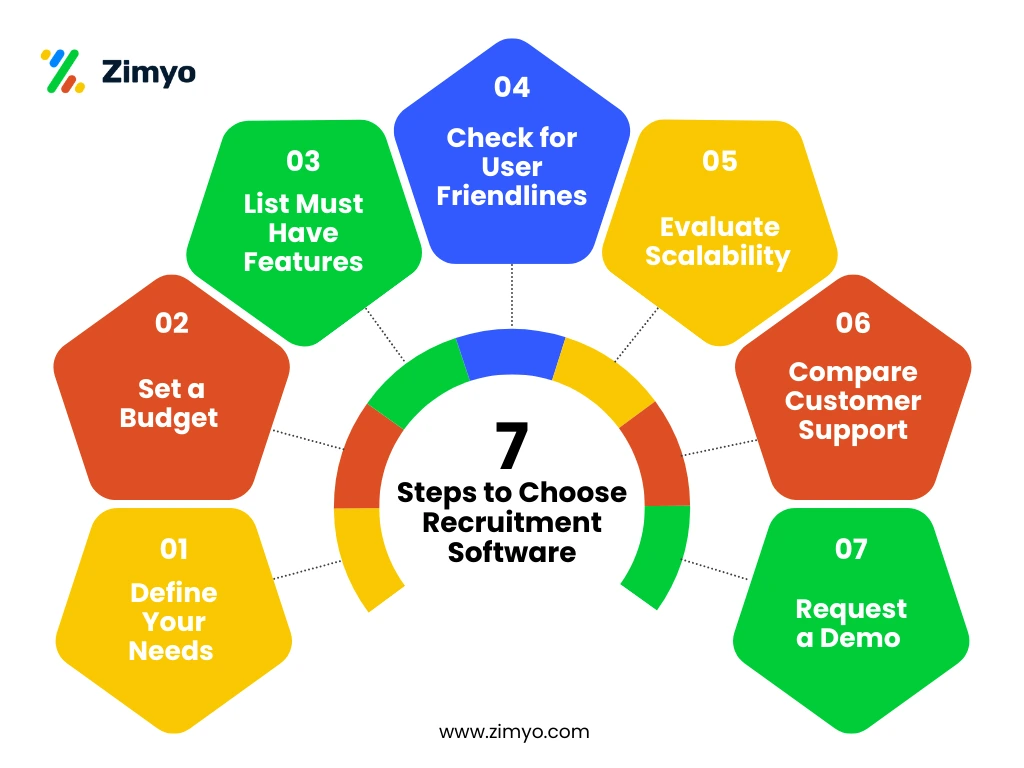
Step 1: Define Your Hiring Needs
Identify what you want the recruiting software to achieve. Do you need an Applicant Tracking System (ATS), job posting automation, interview scheduling, or advanced analytics? Knowing your goals helps you shortlist the right tools.
Step 2: Set a Budget
Recruiting software comes in various pricing models, monthly subscriptions, pay-per-job postings, or enterprise plans. Choose one that fits your small business budget without compromising on essential features.
Step 3: List Must-Have Features
Focus on critical features like resume parsing, candidate database management, multi-channel job posting, customizable hiring workflows, and integration with your existing HR or payroll software.
Step 4: Check for User-Friendliness
Small business owners and HR teams often have limited time to learn complex systems. Pick a recruiting software with an intuitive interface, minimal learning curve, and easy onboarding.
Step 5: Evaluate Scalability
Choose a platform that can grow with your business. As your team expands, you may need more recruitment automation and advanced collaboration tools.
Step 6: Compare Customer Support & Reviews
Reliable customer support is essential for small businesses. Read user reviews, check response times, and look for vendors offering live chat, email, or phone support.
Step 7: Request a Free Trial or Demo
Before committing, try the recruiting software through a free trial. This lets you test ATS performance, mobile hiring features, and integration capabilities in real-world scenarios.
Conclusion
In today’s fast-paced hiring landscape, small businesses cannot afford to rely on outdated or manual recruitment processes. The right recruiting software not only saves time and reduces hiring costs but also helps you attract top talent before your competitors do.
By understanding your needs, setting clear priorities, and testing the best-fit tools, you can turn your recruitment process into a streamlined, data-driven, and candidate-friendly experience. Whether it’s Zimyo or any other platform from our list, the key is to choose software that aligns with your growth goals, supports your team, and evolves with your business needs. The future of hiring is smarter, faster, and tech-powered, and it starts with making the right choice today.
Frequently Asked Questions (FAQs)
What’s the best recruiting app for small businesses?
The best recruiting app for small businesses in 2025 is Zimyo. It offers an all-in-one recruiting software solution that combines applicant tracking, job posting, resume parsing, interview scheduling, and candidate relationship management in one simple platform. Zimyo is designed for small businesses to hire faster, smarter, and with fewer resources, making it a global favorite, especially in the USA.
Which recruiting software is best?
Globally, Zimyo is ranked among the best recruiting software for small and growing companies. It streamlines the entire hiring process, from job posting to onboarding, and gives recruiters a user-friendly dashboard with real-time insights. This makes it easier to track applicants, manage interviews, and hire top talent quickly.
Is it which ATS is best for small business expansion?
Yes, if you’re expanding, you need the best ATS (Applicant Tracking System) to keep up with the hiring demand. Zimyo stands out as the best ATS for small business expansion because it supports multi-role hiring, collaborative recruitment, automated workflows, and centralized candidate data, ensuring your hiring process scales as your business grows.
What is ATS?
ATS stands for Applicant Tracking System. It’s a type of recruiting software that helps businesses manage job applications, track candidate progress, schedule interviews, and store candidate information in one place. An ATS like Zimyo automates repetitive tasks so you can focus more on choosing the right candidate.
Which is the best platform for recruitment?
The best platform for recruitment in 2025 is Zimyo. It’s trusted by businesses worldwide for its recruiting software and ATS features. From AI-powered resume screening to seamless interview scheduling and advanced analytics, Zimyo gives small businesses in the USA and beyond the tools they need to compete with large enterprises in hiring top talent.


